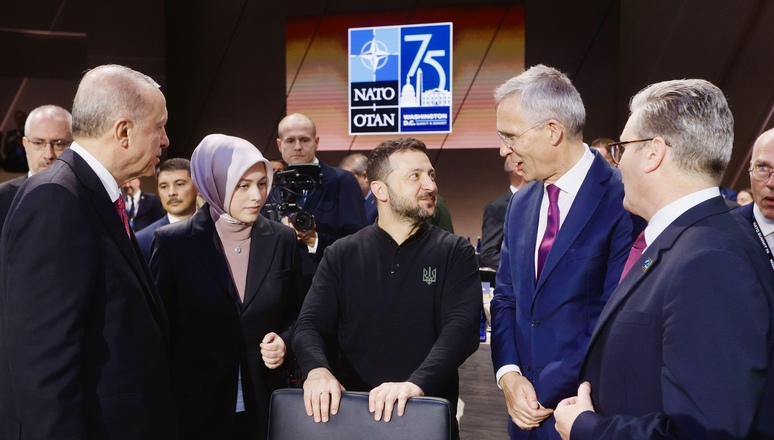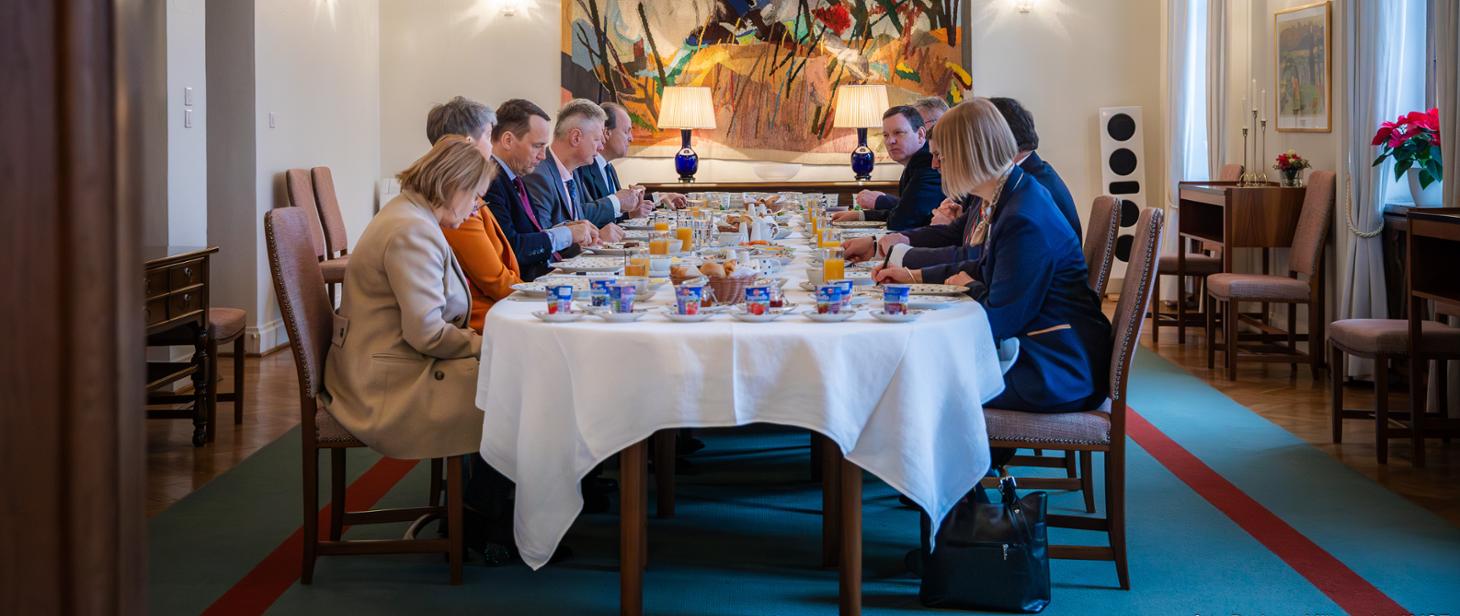
Russia Struggles to Counter Upgrade of NATO-Ukraine Compact
Russia Struggles to Counter Upgrade of NATO-Ukraine Compact
Executive Summary:
- The recent North Atlantic Treaty Organization (NATO) summit in Washington yielded many practical decisions on building Western military capabilities and sustaining offensive operations in Ukraine through bilateral security agreements and increased aid from “frontline” states.
- Moscow hopes to exploit NATO divisions, but Russian President Vladimir Putin’s plan for stirring discord in the West by issuing vague threats and nuclear blackmail involves risks he is not actually prepared to take.
- Putin’s war against Ukraine continues to put pressure on Western policy regarding support to Ukraine. Opinions on how to respond to Russia are polarized, but the overall position on expanding support for Ukraine remains solid among Western powers.
The Washington Summit celebrating the 75th anniversary of the North Atlantic Treaty Organization (NATO) was destined to be among the high marks in the 2024 political calendar. Moscow sought to downplay the importance of this event and portray it as a major escalation of the threat to global security. Such a heavy spin on two contradictory messages is a typical pattern of Russian propaganda. While some commentators compare NATO with the mighty dinosaurs of the past, doomed to extinction by changes in the political climate, others describe it as a monster that needs to be confronted and slayed (RIAC; Izvestiya, July 11). Other Kremlin propagandists present the summit’s proceedings as an orchestrated show of unity, which is eroding and cracking (Kommersant, July 10). Only scant mentions were given to the Ukraine Compact, signed by 23 states and the European Union, which effectively canceled the Kremlin’s design for “neutral” Ukraine (RBC, July 12). The signing of this compact demonstrates that Western states are behind Ukraine in the war and will continue to provide aid, even if it is not all that Kyiv hopes for, showing Russia that its allies in the West continue to dwindle.
Besides declaring Ukraine’s “irreversible” path to NATO, the summit has yielded many practical decisions on building up Western military capabilities, and Moscow has been hard-pressed to find responses. Primary emphasis has been on sustaining the tempo of several offensive operations in Ukraine to maintain the strategic initiative (Republic.ru, July 10). This urge to demonstrate Russia’s dominance results in heavy casualties, which have reached the highest mark since the start of the war (Mediazona, July 5; see EDM, July 10; The Moscow Times, July 12). Russian forces have been wasting more soldiers as fresh cannon fodder and at a rate faster than the increasingly expensive recruitment. Public support for continuing the offensives has registered a new low, while the preference for starting peace talks has reached a high of 58 percent (Levada.ru, July 4; Re: Russia; see EDM, July 10).
The sociology of how Moscow’s war against Ukraine is hurting ordinary people may not be particularly convincing for Western policymakers. The Russian missile strike that hit the children’s hospital in Kyiv on July 8, however, certainly made an impression (Meduza, July 10). While it seems that the famous Ohmatdyt Children’s Hospital was targeted deliberately, questions still abound. The purpose of the strike was likely to prove that the X-101 cruise missiles launched from Tu-95MS strategic bombers can break through missile defenses provided by MIM-104 Patriot batteries (Novaya gazeta Europe, July 10). This capability underpins the planning of massive Russian missile strikes on Ukrainian air bases where the squadrons of newly arrived F-16 fighters will allegedly be hosted (Meduza, July 1). A sequence of such strikes on Myrhorod Air Base in Poltava region earlier this month destroyed and damaged several Ukrainian Su-27 fighter jets (Rossiiskaya gazeta, July 5).
For NATO, the Russian intent gives fresh impetus to not only expanding the deliveries of various surface-to-air missile systems to Ukraine, which should protect major Ukrainian cities and the key airbases (see EDM, June 20, 27, July 3; TopWar.ru, July 12). It also raises the issue of granting Ukraine permission to use Western long-range strike capabilities for attacks on Russian bases deep within Russia’s territory, as President Volodymyr Zelenskyy argued at the Washington Summit (Kommersant, July 13). Ukraine delivered several such strikes using its own drones, for instance, on the Morozovsk base in Rostov region, but only high-precision targeting on stationary aircraft can ensure an effective hit due to the small payloads on long-range drones (NV.ua, June 14; Newsru.com, June 15).
Another issue is the possibility of servicing and repairing the F-16 fighters on bases in Poland and Romania to be moved to forward bases in Ukraine for performing combat missions (MK.ru, July 11). The security agreement signed by Zelenskyy and Polish Prime Minister Donald Tusk on the eve of the NATO summit may allow for such basing. The proposition for intercepting Russian missiles approaching Poland over Ukrainian territory is also on the table (Current Time, July 10). Moscow has already signaled its ire with the agreement, and it is likely even more anxious about the plan for recruiting and training a combat brigade from Ukrainian refugees currently residing in Poland (Nezavisimaya gazeta, July 11).
What worries Russia even more is the US-German agreement on the experimental and permanent deployment of several long-range weapon systems to US bases in Germany (Kommersant, July 11). Even if the new hypersonic Dark Eagle ground-launched missile may not be ready for deployment before 2026, the shift in Germany’s security stance is a significant setback for Moscow’s hopes of exploiting divisions in NATO (RIAC, July 11). That shift is further confirmed by a deal between Germany, France, Italy, and Poland on developing a new long-range cruise missile, which was also announced during the NATO summit (Rossiiskaya gazeta, July 11). If Russia had sought to derail this deal through their recent assassination attempt on Armin Papperger, CEO of Rheinmetall, the leading German defense corporation, the Kremlin’s denials are insufficient for camouflaging the fiasco of this plot (Svoboda.org, July 11; Izvestiya, July 12).
Russian President Vladimir Putin’s plan for stirring anxiety and discord in the Western coalition by issuing vague threats and resorting to nuclear blackmail is not working. His persistent “advice” on raising stakes further involves risks he is not prepared to take (RIA-Novosti, July 11). Putin’s only interlocutor among Western leaders is Hungarian Prime Minister Viktor Orbán, who visited Kyiv, Moscow, and Beijing before traveling to Washington and described his impressions in a succinct letter to EU leadership (Carnegie Politika, July 5). Neither Orban nor Turkish President Recep Tayyip Erdogan, who still expects Putin to make the long-promised visit to Ankara, expressed any dissent at the Washington Summit on key issues including the establishment of NATO Security Assistance and Training for Ukraine in replacing the Ramstein format (Izvestiya; NV.ua, July 11).
Moscow’s long war generates sustained pressure on Western policy, in which opinions on proper responses to Russia’s aggression are inevitably diverse and even polarized. What the Washington Summit made apparent, nevertheless, is that the mainstream political position on expanding and upgrading the support for Ukraine is solid, very much against expectations in Moscow. Another trend that goes against Russian predictions is the strengthening of European contributions to the collective efforts, not because of demands from the US leadership but due to a broader understanding of the scope of threat emanating from Putin’s Russia. “Frontline” states, including Poland, Estonia, or Norway, are taking the lead in assuming and sharing the responsibility for ensuring Ukraine’s victory. Russia can neither inhibit nor sabotage this solidarity.


